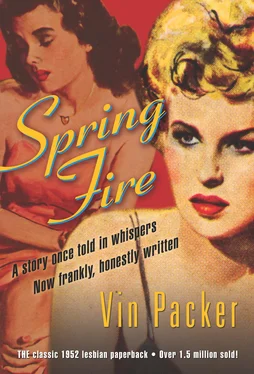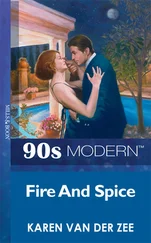Fan mail arrived by the cartons, a second printing, then a third, were ordered immediately. I was invited upstairs to the publishers’ penthouse where Roger Fawcett would shake my hand and show me his new toy, a naked male statue with soda water dispensed through the gold penis.
Spring Fire kept me for many years, although the Vin Packer pseudonym would henceforth be used for suspense books.
I had randomly chosen that name after having lunch with a man named Vincent and a woman whose last name was Packer.
I went on to write suspense solely because I was told that major mystery critics always reviewed paperback books, too.
There were two more Packer books, of twenty-two, dealing with homosexuality, but both were true crimes fictionalized. Whisper His Sin (my title had been One to Destroy ) was the Fraden/Wepman cyanide cocktail murder, a matricide in Manhattan. Then The Evil Friendship (my title had been Why Not Mother? ) was the Parker/Hulme New Zealand matricide, called to my attention by the New York Times mystery critic, Anthony Boucher.
I created another new identity, Ann Aldrich, writing for Gold Medal a journalistic series reporting on lesbian life in New York City. There were five books in all, their titles reflecting the changing mores. The first title was We Walk Alone , and the last one was Take a Lesbian to Lunch .
These were all non-fiction books, which also realized many repeat printings.
If anything, Spring Fire (and the Aldrich books) alerted the publishing world to the fact there was a very large audience for books about lesbians. Of course, some of the readers were men, hoping for a pornographic buzz, but the fan mail came from women all over the United States.
On the cover were two females who looked a lot like hookers, sitting in their slips on a bed. Lesbian readers were able to look past the cover: to find themselves between the pages. We always found ourselves. Some incredible word-of-mouth, grapevine, whatever you want to call it, alerted us to the books, just as we found our bars, and just as we heard the gossip about movie stars and sports stars, actors, poets, and public figures who were like us, and from whom we could borrow glory.
For years I have been reluctant to have Spring Fire returned to print.
My first book, it is a very young book. There is a lot that embarrasses me about the writing. As soon as I became politically conscious, the ending, of course, embarrassed me.
But now that I am older, I am less hard on the young writer whose mother cried out, upon receipt of a copy, “Have you no shame?” And now when I explain to the younger generation what lesbian life was like in the ’50s, I make no apologies. We did what we had to do, informed by the times. Shameless, persevering, we began recording our history … and this is part of it.
Vin Packer
IT WAS TWO-THIRTY IN THE AFTERNOON, late September, with the sun beating down the way it does then in the Midwest, and the dust in the streets. The girl, Susan Mitchell, was wearing a green linen suit that clung on her large body heavily, a round white straw hat from which short pieces of blonde hair hung limply, and brown and white shoes with low heels that made her long feet look longer. She was not pretty. She was not lovely and dainty and pretty, but there was a comeliness about her that suggested some inbred strength and grace. It was in her face. It was in the color of her eyes—deep blue like the ocean way out there, but quiet and still. It was in the structure of her cheekbones, high and firm coming down to pull her chin up. She walked that way, too. She walked easy and sure. She was following College Avenue down to where the main gate was, and the road that led through the gate to the campus of Cranston University. All around her there were signs in the windows of bookstores and drugstores and dress shops and bars and the signs said: “WELCOME BACK C.U.”
The gate was open and the wide slate walks surrounding the immense green lawn were dotted with boys and girls, walking together in groups, sitting alone on benches, standing thoughtfully in doorways, and waiting wearily in long registration lines. Susan Mitchell had registered two weeks ago.
“You’ll have enough to think about during rush week,” her father had promised, “without worrying about getting yourself enrolled. We’ll do it early. Then you can concentrate on impressing those sorority gals. Don’t be nervous either. Remember, your father still loves you, no matter what.”
And so it was there again—his fear for her. His fear that she was not good enough. Because he had not been. He had worked hard, and not gone to college, and not had luxuries, and not learned not to say “ain’t,” and not anything. Until the war and the men came that day and looked at the factory and talked with him and signed papers and he was rich then. And then he was afraid.
He had driven her from Kansas City to register, and when she had finished, he had asked someone how to get to “Greek Town,” and with him she had first seen it.
Greek Town was the home of the sororities and fraternities and it was magic over there, close to the stadium, within walking distance of the campus, but not huddled up in narrow streets the way the dorms and boardinghouses were. It was magic, with street after street of grand houses—brick, stucco, stone, and fresh white wooden houses. Each one had a gold plaque with shining Greek letters, and nearly all of them had spacious yards, winding driveways, and huge white columns that stood impressively, symbols of magnificence. Then she too had felt a thin shiver of fear.
Tomorrow she would go to the sorority houses to be judged; but now as she walked on the campus she forgot about that momentarily, and smelled the grass that had been cut and watered, and it was good. The ivy, crawling up along the walls of the building, was massive and cooling, and the big trees made shade along the path. She sat for a while on the rock bench there where the breeze came along, and it was peaceful.
A group of laughing girls passed, arms entwined, faces glowing with excitement.
“… anyway,” one of them was saying, “it turned out he was from St. Louis—Webster, in fact—and he knew loads of kids I knew.”
“My God!” another shrieked. “Didn’t you tell him I was from Webster?”
Later Susan Mitchell walked back toward the gate and the street leading to the hotel where she was staying. A convertible whizzed by and kicked up clouds of the dust that settled near the curb, and at the corner when it turned, the tires squealed nervously. In the doorway of a restaurant, a tall boy stood holding hands with a small, brown-eyed girl whose hair was flaxen. “God,” he said, “all summer I had you on my mind, Annie. No bull, I thought about you all summer.”
When Susan Mitchell reached the lobby of the hotel, the low leather couches and chairs were filled with girls, and several rows of luggage were lined up near the desk. She asked for her key, wary of the arrogant, crooked-nosed clerk who always yelled, as he did now. “Speak up, girlie,” he said. “I ain’t deaf and I can’t read lips.”
“Susan Mitchell,” the girl said louder. “Four-o-one.”
He handed her the metal key with the wooden tab attached and she hurried off to the waiting elevator.
“Good God,” the uniformed pimple-faced boy said when she stepped into the small box. “You girls! Up and down all the damn day long! I never seen the likes of this bunch. The sororities are welcome to you!”
“The next name, girls,” Mother Nesselbush said, “is Susan Mitchell.”
At her feet, sitting on the wide tan rug, the members of Tri Epsilon polished their nails, knitted, rubbed cold cream into their skin, and rolled their hair up on rags and iron curlers and bobby pins. Mother Nesselbush thumbed through the papers on the card table in front of her. She was a fat woman with a nervous twitch in her jowls and short, squat legs. Twenty years ago she had been a slim coed with long golden hair, a gay young face, and a heart-shaped Tri Epsilon pin attached to her budding bosom. Five years ago, when J. Edman Nesselbush fell dead, she returned to the Cranston campus and took over the duties of the housemother at Epsilon Epsilon Epsilon. Now she was a wide dowager with wiry gray hair and a worn, wrinkled face. In place of the pin now, there was a gravy stain from the noon meal slopped onto her broad, lace-covered chest.
Читать дальше












